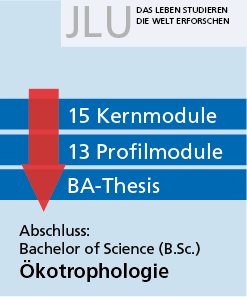Composition of the Study Programme
Components of the study programme
The programme consists of 17 core modules (compulsory modules) and 11 profile modules (elective modules). Each module has a scope of 6 CP (4 hours per week for one semester) and concludes with a course-related examination. The grades achieved in the individual module examinations result in the final degree grade. In addition, the programme includes a Bachelor's thesis, which is equivalent to 2 modules. This proves that you are capable of independently writing a scientific paper.
Individual profile
The development of an individual profile plays a major role in the degree programme. Our students decide for themselves whether they want to acquire a broad all-round knowledge or prefer to specialise, whether their studies are more practice-oriented or scientific and theoretical. They can choose profile modules from the complete range of courses offered by the Department 09 or even from other departments at JLU.
Practical relevance
In addition to choosing practice-oriented modules, students have the opportunity to complete an internship to gain a first insight into professional life. Module BP 144 "Professional Internship" corresponds to 12 CP and can be chosen as a profile module in all Bachelor's degree programmes of Faculty 09. In this way, students familiarise themselves with the professional world and get suggestions for the individual organisation of their further studies. The Internship Office maintains a database of suitable companies and institutions and supports students in their search for a suitable internship.
Composition of degree programme

The course content is divided into modules. Each module has a scope of four semester hours 6 CP (4 semester hours each) and concludes with a course-related examination. The grades achieved in the individual module examinations result in the final degree grade.
17 of the modules are compulsory (core modules), 11 modules are profile modules and can be selected from the entire range of courses offered by the department. The Bachelor's thesis corresponds to the scope of two teaching modules.
Individual specialisation takes place through the choice of profile modules. The degree programme is successfully completed when all modules have been passed.
| 1st semester | 2nd semester | 3rd semester |
|---|---|---|
| Economics and business administration | Anatomy and Physiology I | Mathematics and Statistics |
| Fundamentals of process technology and thermodynamics | Human nutrition | Nutritional Physiology |
| Sustainability of food | Politics of the agricultural and food economy | Consumer behaviour |
| Food systems |
Introduction to catering management |
Basics of nutrition therapy |
| Marketing in the agricultural and food industry | General Chemistry | Basics of counselling |
| 4th semester | 5th semester | 6th semester |
|---|---|---|
| Introduction to empirical social research | Specialisation Module 4 | Specialisation Module 9 |
| Sociology of nutrition | Specialisation Module 5 | Specialisation Module 10 |
| Specialisation Module 1 | Specialisation Module 6 | Specialisation Module 11 |
| Specialisation Module 2 | Specialisation Module 7 | Bachelor's dissertation |
| Specialisation Module 3 | Specialisation Module 8 | Bachelor's dissertation |
Specialisation modules
Broad all-round knowledge or specialisation - both are possible. Our students have it in their hands, they put together their studies according to their individual inclinations from the entire range of our offerings. In a catalogue of over 80 modules, students can choose profile modules from the following topics, for example:
- Human nutrition
- Dietetics
- Biochemistry and molecular biology
- Nutritional Medicine
- Nutrition and the Immune System
- Food Sciences
- Molecular Nutrition Research
- Communication and Counselling
- Nutritional and Environmental Psychology
- Consumer Behaviour
- Market theory
- Agricultural, food and environmental policy
- Business administration
Modules from other research fields of the department can also be chosen, e.g. agricultural production and its impact on the environment, applied microbiology, soil science, insect biotechnology, plant production and breeding and animal welfare.
The exact names and descriptions of the profile modules can be found in the Special Regulations.
